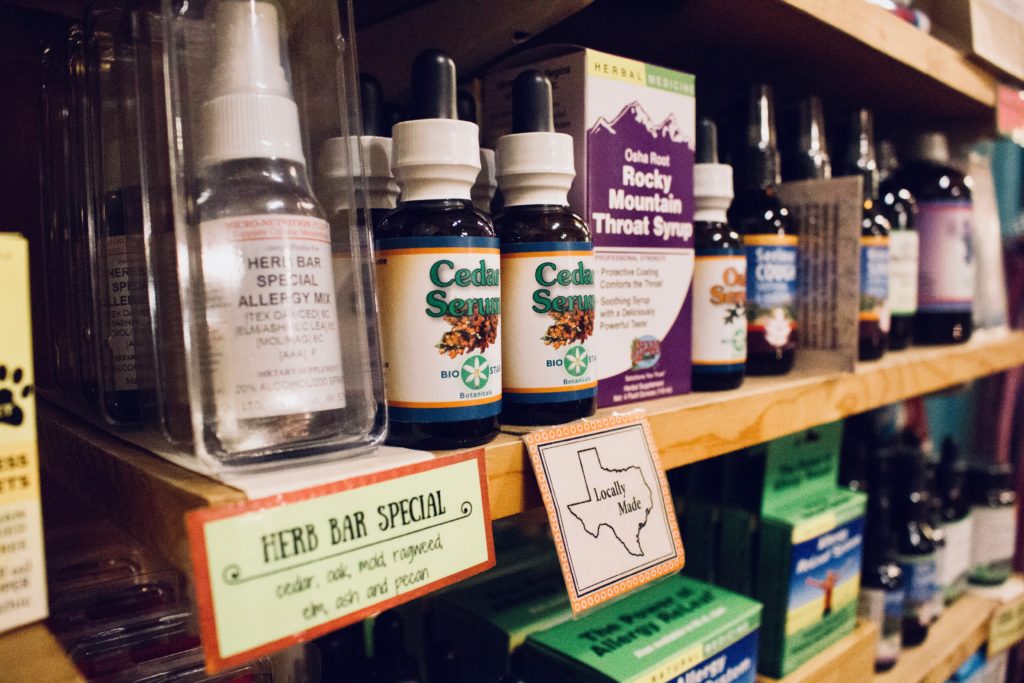Check out alternative solutions for allergy relief when honey isn’t cutting it.
Story and photo by Sabrina LeBoeuf

For Austinites who are still in search of relief from the city’s allergens, there is a plethora of remedies that go beyond consuming local honey.
According to Dr. Maria Gutierrez, who has been an allergist for more than 20 years, there’s no harm in going the local honey route, but there is no medical evidence to support its effectiveness.
“I have patients who do the local honey. I’ve had patients who do the juniper berries,” Gutierrez says. “There’s no harm to doing that, but they may not work.”
Instead, she recommends over-the-counter treatments, such as nasal rinses, nasal sprays and antihistamines. If these medications prove ineffective, Gutierrez suggests seeing a doctor to discuss whether steroids may work.
In addition to the lack of evidence behind local honey’s effectiveness against allergies, there’s an entire group of people who can’t consume honey: vegans.
Samantha Hall, a vegan and undergraduate student at the University of Texas, is allergic to grass, tree and weed pollens, and hasn’t been able to find relief. Local honey isn’t an option for her and over-the-counter medicines haven’t worked.
“I’d really like to do allergy shots, but they’re too expensive,” Hall says. “Another solution my parents and I have talked about is just putting me in a bubble, but that just doesn’t seem practical.”
For nontraditional allergy relief, The Herb Bar specializes in helping patrons find remedies specific to their individual symptoms and day-to-day habits.
“We [help] people with their symptoms,” says Jenny Oakwalker, a wellness advisor and the manager at The Herb Bar. “Are you stuffy or runny? What kind of product are you more likely to reach for and use throughout the day to help you?”
The Herb Bar offers a wide variety of products, ranging from teas to extracts to homeopathic remedies. Two of the store’s more popular allergy-fighting products are the Cedar Serum and the Herb Bar Special Allergy Mix.
Concocted by Austin herbalist Carlos Hernandez-Calderoni, Cedar Serum specifically targets cedar. It’s taken once a day by adding drops of the serum to a glass of water. The Herb Bar Special Allergy Mix is a spray made by Celletech and is unique to the store.
“A number of years ago, we contacted Celletech and said, ‘Hey, could you do something that’s really specific to Central Texas?’ ” Oakwalker says. “We sent them samples of the allergies and pollens in our area, and they made this formula.”
Despite the fact February typically marks the end of cedar season, both Gutierrez and Oakwalker recommend pre-emptive efforts for future cedar seasons.
“After the season is over, you could come in to an allergy office and get allergy tested to confirm that you do have a cedar allergy…so that would identify exactly what you’re allergic to,” Gutierrez says.
From there, patients can either go the route of allergy shots or cedar allergy drops. Both options must be prescribed by an allergist. When it comes to insurance, allergy drops are not covered but shots usually are.
For pre-emptive herbal efforts, Oakwalker recommends starting treatment before the season begins in December. Based on this year’s pollen trend, she recommends people start treating themselves for next cedar season between Nov. 1 through 15.
According to Austin Regional Clinic, the next big allergy seasons will include elm, ash and oak pollens. Elm and ash will be prevalent until the end of March, while oak can last until the end of May.


